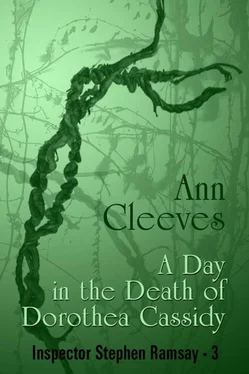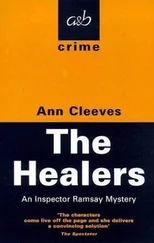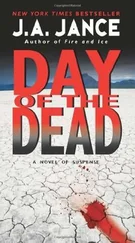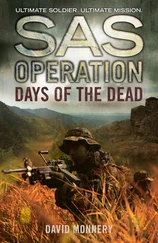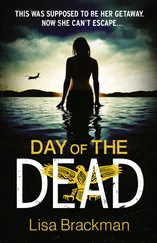Ann Cleeves - A Day in the Death of Dorothea Cassidy
Здесь есть возможность читать онлайн «Ann Cleeves - A Day in the Death of Dorothea Cassidy» весь текст электронной книги совершенно бесплатно (целиком полную версию без сокращений). В некоторых случаях можно слушать аудио, скачать через торрент в формате fb2 и присутствует краткое содержание. Жанр: Детектив, на английском языке. Описание произведения, (предисловие) а так же отзывы посетителей доступны на портале библиотеки ЛибКат.
- Название:A Day in the Death of Dorothea Cassidy
- Автор:
- Жанр:
- Год:неизвестен
- ISBN:нет данных
- Рейтинг книги:5 / 5. Голосов: 1
-
Избранное:Добавить в избранное
- Отзывы:
-
Ваша оценка:
- 100
- 1
- 2
- 3
- 4
- 5
A Day in the Death of Dorothea Cassidy: краткое содержание, описание и аннотация
Предлагаем к чтению аннотацию, описание, краткое содержание или предисловие (зависит от того, что написал сам автор книги «A Day in the Death of Dorothea Cassidy»). Если вы не нашли необходимую информацию о книге — напишите в комментариях, мы постараемся отыскать её.
A Day in the Death of Dorothea Cassidy — читать онлайн бесплатно полную книгу (весь текст) целиком
Ниже представлен текст книги, разбитый по страницам. Система сохранения места последней прочитанной страницы, позволяет с удобством читать онлайн бесплатно книгу «A Day in the Death of Dorothea Cassidy», без необходимости каждый раз заново искать на чём Вы остановились. Поставьте закладку, и сможете в любой момент перейти на страницу, на которой закончили чтение.
Интервал:
Закладка:
He stared out of the window.
Ramsay stood up to leave the room when Corkhill spoke again.
‘Poor bastard,’ he said. ‘He didn’t have much of a life, did he?’
It seemed a fitting epitaph for the boy.
Ramsay called a constable into the room to help Corkhill make his statement then returned to his office. When he got there the phone was ringing.
‘It’s your aunt,’ someone said. ‘She says it’s urgent.’
Ramsay almost refused to speak to her. Tell her I’m too busy, he wanted to say. She can leave a message. But the conversation with Corkhill had chilled him. Corkhill had lost the habit of human contact. He cared for Theresa but preferred loneliness to the responsibilities that came through living with her. Perhaps I’m like that, Ramsay thought. I resent the demands of friendship. So when Annie came through to him he spoke to her kindly, with unusual warmth. But he knew it was all pretence and like Corkhill he was better on his own.
In Armstrong House Annie Ramsay had been playing detectives. At lunchtime she had cancelled the afternoon’s bingo. It wasn’t fitting, she said, after such a tragedy. All the same it brought everyone together for a laugh and a cup of tea and she missed it.
When she first got back from the hospital she pottered around her flat, making scones, thinking that later she would take them round to Emily’s so they could share some tea. She wasn’t much of a cook. Not like her mother… With the memory of her mother, the warm kitchen, the big range in the pit cottage where she had grown up, she pulled herself together. She had always vowed that she would never become one of those old people who bored the pants off the world by talking about when they were bairns. There was more to life than dreaming about the past. Her flat was too quiet, that was the trouble. It looked over the respectable street leading to the park and at this time in the afternoon the children were at school and the parents were away in their offices in the town. She wanted a bit of bustle, a bit of something to watch.
At the front of the building there was a small patch of garden – some lawn, a few pots of geraniums and a wooden bench donated, according to the plaque on the back, by St Mary’s Mother’s Union. The bench was seldom used – too bloody uncomfortable for one thing, Annie thought as she settled herself on to it. And too close to the busy road with its noise, fumes and dust. From where she sat she could see the main road into town and round the corner into Armstrong Street. There, in the mid-afternoon heat, everything seemed quiet, lifeless. In one of the gardens was a pram with a dazzling white sun-shade, but throughout the afternoon the baby made no sound. A little way up the street a car was started. It pulled into the street and disappeared over the brow of the hill into shadow. Annie was aware of it because it was the first thing to move in the street since she had been sitting there, but later she was unable to describe it at all.
‘What about the colour?’ Ramsay would say impatiently when she phoned him. ‘You must have seen that.’
But she had to tell the truth and say she had no idea. She was able, however, to give him an accurate time, because as the car drove off the bell in the primary school on the main street was rung and the children ran out to the lollipop lady on the zebra crossing. The school day finished at a quarter to four.
She spent a few minutes looking at the children, trying to recognise the ones who lived locally, delighting in how brown and healthy they were. When she looked back into Armstrong Street she saw Walter Tanner walking from the direction towards which the car had driven. She had never liked Walter Tanner – his mother had gone to school with Annie and she had always found her a snooty cow – but as she watched him walk slowly along the street she was moved to pity.
‘It was as if he had all the cares of the world on his shoulders,’ she would tell Ramsay later.
‘But the time? What time did Mr Tanner get home?’
‘Ten to four,’ she would say, quite certain, tempted for a moment to lie, just to please him.
‘Are you sure that it couldn’t have been earlier?’
And she would shake her head disappointed and frustrated because she couldn’t be of more help.
She had watched Walter Tanner shuffle down the street to his front door and pause there as if he needed to collect his breath. She had seen him take out his keys, then push open the door, surprised at not needing to use them. She had missed the arrival of the ambulance, Gordon Hunter and the pathologist, because she had decided by then that detecting might run in the family and she could do some investigating of her own.
It had occurred to her while she was sitting in the sun that Thursday was the day the church was cleaned. There was a rota. Annie took her turn with the other ladies to polish pews, hoover the floor and do the silver. Dorothea had tried to persuade some men to be involved in these domestic chores but they had been surprisingly resistant. So, someone would have been in the church the evening before. The hoover, the dusters and the polish were kept in the scullery next to the vicarage kitchen. If Dorothea had returned to the vicarage after all it was possible that one of the cleaning ladies had seen her.
Annie Ramsay found the rota in the drawer of her kitchen table. The first two names against 20 June were of no interest to her. They were active pensioners, keen bowlers, who did their cleaning early in the morning to leave the rest of the day free for their sport. The third was more hopeful. She went under the improbable name of Cuthbertina David and she lived in a flat in Armstrong House.
Cuthbertina David was a tall, angular woman with wild, white hair and enormous flat feet. She was deaf and her hearing aid seemed little use to her. Annie Ramsay stood in the corridor and knocked on Cuthbertina’s door. She was very excited. There was no answer. She knocked again, growing more and more impatient and frustrated. She knew Cuthbertina was there. If the deaf old bat didn’t come soon she would have to fetch the warden for her key. At last the door opened.
‘Eh, I’m sorry, hinnie,’ the woman said. In contrast to her manic appearance her voice was soft and melodic. ‘I didn’t hear you. Come in.’
‘I’ve come about Mrs Cassidy,’ Annie yelled. ‘You must have heard about the tragedy.’
‘No, hinnie. What tragedy’s that?’
‘Didn’t the police come to talk to you this morning?’
‘I’ve been in all morning and I’ve seen no one. But maybe they knocked and I didn’t hear the door.’
Annie shouted an explanation of what had happened, then came to the point.
‘It was your day for church cleaning yesterday,’ she said.
‘Aye,’ Cuthbertina said. ‘ I can’t do any heavy work now. Not with the arthritis so bad. But they let me do the silver. I can sit to do that.’
‘Did you have to go to the vicarage?’
‘Of course. Like I always do. Even if they’re all out there’s a key to the back door in the vestry.’
‘Were they all out yesterday?’
‘No. I thought someone would be there because Mrs Cassidy’s car was parked in the drive.’
‘Did you see Mrs Cassidy?’
‘Yes. She was in the kitchen with the lad, Patrick. I thought she might give me a cup of tea. She’d just made a brew, but they seemed to be busy, serious, you know. I don’t think the lad saw me even, he was that engrossed.’
‘What were they talking about?’
‘Eh, hinnie, you know what my hearing’s like. I didn’t go into the kitchen, only the scullery. How could I tell?’
‘What was the time?’ Annie Ramsay said. ‘Do you know what the time was when you saw her in the vicarage?’
Читать дальшеИнтервал:
Закладка:
Похожие книги на «A Day in the Death of Dorothea Cassidy»
Представляем Вашему вниманию похожие книги на «A Day in the Death of Dorothea Cassidy» списком для выбора. Мы отобрали схожую по названию и смыслу литературу в надежде предоставить читателям больше вариантов отыскать новые, интересные, ещё непрочитанные произведения.
Обсуждение, отзывы о книге «A Day in the Death of Dorothea Cassidy» и просто собственные мнения читателей. Оставьте ваши комментарии, напишите, что Вы думаете о произведении, его смысле или главных героях. Укажите что конкретно понравилось, а что нет, и почему Вы так считаете.
